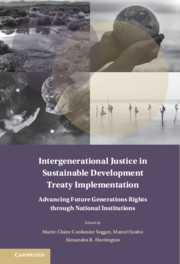 Intergenerational Justice in Sustainable Development Treaty Implementation
Intergenerational Justice in Sustainable Development Treaty Implementation from National Case Studies
Published online by Cambridge University Press: 15 October 2021
This chapter gives an outline of the Parlamentarische Beirat für nachhaltige Entwicklung (Parliamentary Advisory Council on Sustainable Development, PACSD) of the German ‘Bundestag’ (Federal Parliament). Before exploring the creation, functions, and effectiveness of this institution, fairly unknown even in Germany itself, it sketches the development of ecological consciousness and environmental law in Germany as well as the constitutional context. This leads to an analysis of the strengths and the weaknesses of the Parliamentary Advisory Council. The chapter ends with a short legislative outlook and forecast. For the sake of clarity, it should be mentioned at the outset that since Germany is a highly industrial country with a long history of environmental problems the German perspective on sustainability stresses the ecological, rather than the economic or social, dimensions which in turn is mirrored in the work of the PACSD.
To save this book to your Kindle, first ensure [email protected] is added to your Approved Personal Document E-mail List under your Personal Document Settings on the Manage Your Content and Devices page of your Amazon account. Then enter the ‘name’ part of your Kindle email address below. Find out more about saving to your Kindle.
Note you can select to save to either the @free.kindle.com or @kindle.com variations. ‘@free.kindle.com’ emails are free but can only be saved to your device when it is connected to wi-fi. ‘@kindle.com’ emails can be delivered even when you are not connected to wi-fi, but note that service fees apply.
Find out more about the Kindle Personal Document Service.
To save content items to your account, please confirm that you agree to abide by our usage policies. If this is the first time you use this feature, you will be asked to authorise Cambridge Core to connect with your account. Find out more about saving content to Dropbox.
To save content items to your account, please confirm that you agree to abide by our usage policies. If this is the first time you use this feature, you will be asked to authorise Cambridge Core to connect with your account. Find out more about saving content to Google Drive.